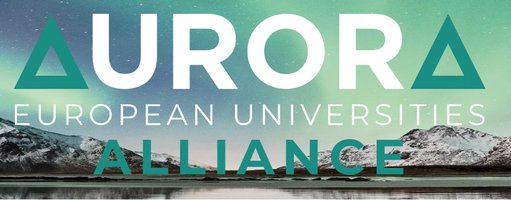Aurora Lecture Series
„The Making of Europe“
Silke Meyer & Dirk Rupnow (University of Innsbruck)
organised by the Aurora pilot domain "Culture: Diversity & Identity“ and by the research area "Cultural Encounters - Cultural Conflicts“
This lecture series invites students from all nine Aurora partner universities to reflect “The Making of Europe”. From Reykjavik to Napoli, we will discuss examples of constructing Europe from the perspectives of EU governance, popular culture and memory politics.
Europe is a concept with many connotations, encompassing both a space and a political system. In everyday language, Europe is also equated with the institutions of the European Union. The term ‘Europeanisation’ generally refers to the political unification process since the Second World War, but encompasses more than political agreements and laws, also social norms and ideas.
We want to examine the historical, social and cultural dimensions of Europeanisation and look at the initiatives, instruments and institutions that constitute Europe and 'Europeanness' and position Europe into the everyday life and self-image of its citizens. This includes transnational co-operations such as town twinning, Erasmus student exchange, the Euro as a common currency, pop cultural phenomena such as the Eurovision Song Contest, art formats such as the European Capital of Culture and examples of European politics of remembrance in museums and exhibitions. EU institutions will also be represented when we discuss the making of Europe with Christian Gsodam, Head of Cabinet of the Secretary General, European Committee of the Regions.
On a theoretical level, special attention is given to the perspective of provincialising and decolonising Europe: We ask about the intersectionality of citizenship, religion, and class in order to understand Europe and Europeanness as multi-layered and multi-voiced in a global context.
Assessment:
At the end of term, students will be given a number of essay questions based on the weekly lectures. They can choose one question and answer it in an essay of 7-10 pages. The essay should contain footnotes and further references (included in the 7-10 pages).
Literature:
Patel, Kiran Klaus (2020). Project Europe. A History. Cambridge UP.
Patel, Kiran Klaus (2015). The Making of Homo Europaeus: Problems, Approaches and
Perspectives. In: Comparativ. Zeitschrift für Globalgeschichte und vergleichende Gesellschaftsforschung, 25, issue 5-6 (2015), 15–31.
October
12/10/2022
Introduction (Silke Meyer, Dirk Rupnow, both University of Innsbruck)
November
09/11/2022
Historical Concepts of Europe (Stefan Ehrenpreis, University of Innsbruck)
16/11/2022
Virtual Young Citizen Science Dialogue with Christian Gsodam (European Committee of the Regions, Brussels)
The event with Christian Gsodam is hosted by the EU in Brussels.
Registration link.
30/11/2022
The Eurovision Song Contest and European Integration (Dean Vuletic, University of Vienna)
December
07/12/2022
Europeanisation from bottom-up and across borders: The European Region Tyrol-South Tyrol-Trentino (Alice Engl, Eurac Research, Bolzano)
14/12/2022
Europe outside Europe: Europeanness and Political Discourses of the West in Northern America (Agnieszka Weinar, Carleton University, Ottawa, Canada)
January
11/01/2023
Exhibiting Europe (Kerstin Poehls, University of Hamburg/Open Air Museum Molfsee)
18/01/2023
European Capitals of Culture: Cultural policies - anthropological perspectives (Daniel Habit, LMU Munich)
25/01/2023
An “active promotion of the European ideal”? - Europe and Town twinning (Nina Szidat, University of Duisburg/Essen)
February
01/02/2023
Final Discussion and Closing Remarks (Silke Meyer, Dirk Rupnow)
Concept and organization
Univ.-Prof. Dr. Silke Meyer, Institut für Geschichtswissenschaften und Europäische Ethnologie
E-Mail: silke.meyer@uibk.ac.at, www.uibk.ac.at/geschichte-ethnologie/institut/mitarbeiterinnen/univ-prof/meyer-silke und
Univ.-Prof. Dr. Dirk Rupnow, Institut für Zeitgeschichte
E-Mail: dirk.rupnow@uibk.ac.at, www.uibk.ac.at/zeitgeschichte/mitarbeiterinnen/rupnow
Felix Neuner
E-Mail: felix.neuner@student.uibk.ac.at
In cooperation with
AURORA Alliance (www.uibk.ac.at/international/aurora)
Co-funded by the Erasmus+ Programme of the European Union
E-mail: Aurora@uibk.ac.at
Datenschutzhinweis
Im Rahmen dieser Veranstaltung können Fotografien (oder Screenshots) und/oder Filme erstellt werden. Mit der Teilnahme zur Veranstaltung nehmen Sie zur Kenntnis, dass Fotografien und Videomaterialien, auf denen Sie abgebildet sind, zur Presse-Berichterstattung verwendet und in verschiedensten (Sozialen) Medien, Publikationen und auf Webseiten der Universität Innsbruck veröffentlicht werden. Weitere Informationen zum Datenschutz entnehmen Sie bitte unserer Datenschutzerklärung unter: www.uibk.ac.at/datenschutz
Wir bitten um eine umweltfreundliche Anreise! Mit den öffentlichen Verkehrsmitteln, zu Fuß oder mit dem Fahrrad. Fahrradabstellplätze stehen ausreichend zur Verfügung. Informationen zu den öffentlichen Verkehrsmitteln finden Sie unter www.vvt.at



